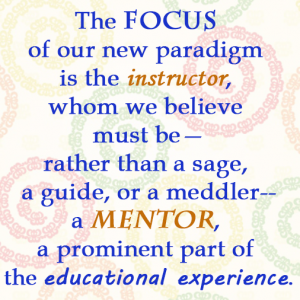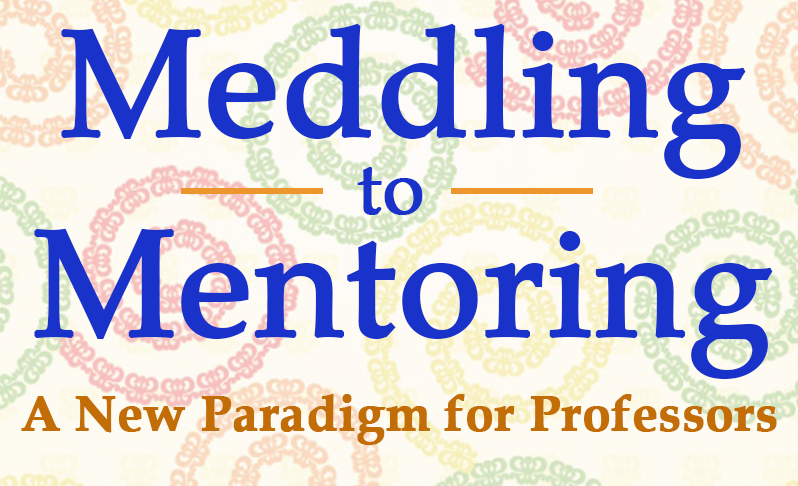Aristotle taught the science of motion, and as such he had figured out that a key ingredient to the instructor-student relationship was movement. (Tweet this quote.) Centuries later, Isaac Newton proclaimed his first law of motion: a body at rest continues at rest unless acted upon by an outside force, and a body in motion continues in motion. Both Aristotle and Newton understood a prime principle of pedagogy that Aristotle demonstrated daily with his gait.
A mind in motion (activity) learns, and if it helps, while reading this post, pretend you are walking with me both listening and conversing. Or stop reading for a while, drop down for a few push-ups, or jog. Conversely, neither physical nor mental inertia is a good thing. Molecular biologist John Medina believes that there really is a silver bullet for American education, exercise, but that’s another story.
Motion, whether it’s the flickering image on your TV screen or your instructor in the middle of your classroom, captures your attention. Motion allows the mind to move from old knowledge to new. (Tweet this quote.) Motion prevents us from becoming physical and mental couch potatoes. And motion in the classroom is a primary way learners are transformed through such activities as on-demand writing, giving an impromptu speech, or using manipulatives, whether they are Legos, ThinkerToys, or something else.
Permeating all our prose is the key concept of the instructor maintaining authority. In short, the instructor is a leader, a person who has a shared vision with students . . . and more.
A New Paradigm for Mentoring
Five years ago I was having coffee and a chat in the Faculty Lounge with the chair of the Faculty Senate and the University Provost about the mission of higher education when the latter proclaimed, “The university is in the knowledge-creation business.” Back then, we all nodded our heads in agreement, but now we question that pronouncement and our judgment. If knowledge changes so quickly and is so readily accessible, hasn’t the historic mission of the university also changed? Doesn’t higher education need to develop skills, skills such as creative and critical thinking, teamwork, communication, and a scholarly frame of mind that fosters intellectual inquiry?
In 2011 at the annual meeting of the EDUCAUSE Learning Initiative one of the discussions centered on whether the need still exists for traditional college courses. After all, as Jeffrey Young (2012) states, “In an era when students can easily grab material online, including lectures by gifted speakers in every field, a learning environment that avoids courses completely—or seriously reshapes them—might produce a very effective new form of college” (A14).
I couldn’t disagree with Young and others more, but I do admit the old ways no longer work. What was judged as effective teaching when Hal Blythe and Charlie Sweet began as college instructors 40 years ago and even a few years ago when I entered the profession is now in need of serious change.
Six Roles of the Mentor
 The focus of our new paradigm is the instructor, whom I believe must be—rather than a sage, a guide, or a meddler–a mentor, a prominent part of the educational experience. And as that mentor, the instructor assumes six distinct, but inter-related roles:
The focus of our new paradigm is the instructor, whom I believe must be—rather than a sage, a guide, or a meddler–a mentor, a prominent part of the educational experience. And as that mentor, the instructor assumes six distinct, but inter-related roles:
• Facilitator
• Coach
• Artist
• Critical Reflector
• Model
• Scholar.
While you’ve probably heard of the term mentor and could offer a short definition (e.g., a mentor in business is a common practice), do you know from where the term derives?
In Greek mythology Odysseus, just before he started his journey to and from the Trojan War, asked the elderly Mentor to tutor his son, Telemachus. And interestingly, when Athena, goddess of wisdom, later came to Telemachus, she took the form of Mentor. A mentor, then, as the mythic metaphor makes clear, is a wise authority figure who tries to inculcate wisdom in a less-wise individual and transform that learner into an active creative thinker.
Come back to the blog to examine the mentor’s six roles.
Author
 Dr. Russell Carpenter is director of the Noel Studio for Academic Creativity and Program Director of the Minor in Applied Creative Thinking at Eastern Kentucky University. He is also Assistant Professor of English. Dr. Carpenter has published on the topic of creative thinking, among other areas, including two texts by New Forums Press. In addition, he has taught courses in creative thinking in EKU’s Minor in Applied Creative Thinking, which was featured in the New York Times in February 2014. Meet Russell.
Dr. Russell Carpenter is director of the Noel Studio for Academic Creativity and Program Director of the Minor in Applied Creative Thinking at Eastern Kentucky University. He is also Assistant Professor of English. Dr. Carpenter has published on the topic of creative thinking, among other areas, including two texts by New Forums Press. In addition, he has taught courses in creative thinking in EKU’s Minor in Applied Creative Thinking, which was featured in the New York Times in February 2014. Meet Russell.




